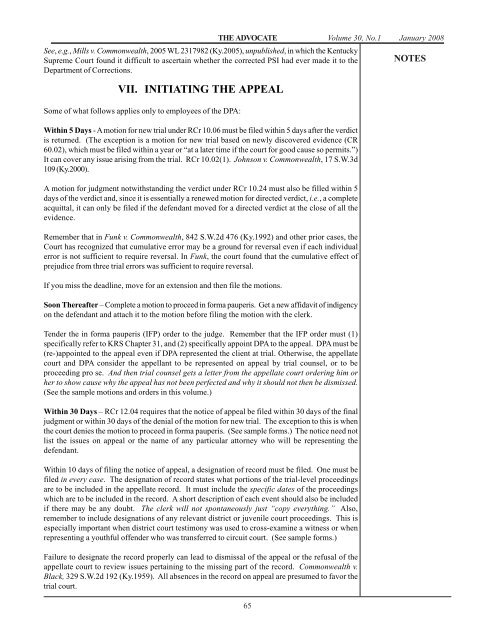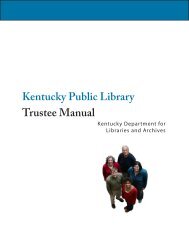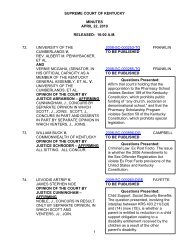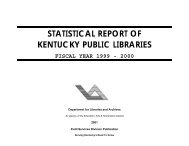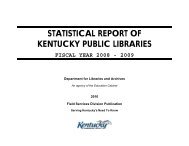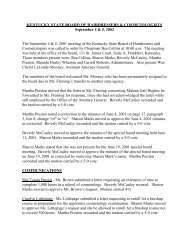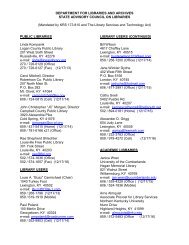Jan08 Advo.pmd - e-archives Home
Jan08 Advo.pmd - e-archives Home
Jan08 Advo.pmd - e-archives Home
Create successful ePaper yourself
Turn your PDF publications into a flip-book with our unique Google optimized e-Paper software.
THE ADVOCATE Volume 30, No.1 January 2008<br />
See, e.g., Mills v. Commonwealth, 2005 WL 2317982 (Ky.2005), unpublished, in which the Kentucky<br />
Supreme Court found it difficult to ascertain whether the corrected PSI had ever made it to the<br />
Department of Corrections.<br />
VII. INITIATING THE APPEAL<br />
Some of what follows applies only to employees of the DPA:<br />
Within 5 Days - A motion for new trial under RCr 10.06 must be filed within 5 days after the verdict<br />
is returned. (The exception is a motion for new trial based on newly discovered evidence (CR<br />
60.02), which must be filed within a year or “at a later time if the court for good cause so permits.”)<br />
It can cover any issue arising from the trial. RCr 10.02(1). Johnson v. Commonwealth, 17 S.W.3d<br />
109 (Ky.2000).<br />
A motion for judgment notwithstanding the verdict under RCr 10.24 must also be filled within 5<br />
days of the verdict and, since it is essentially a renewed motion for directed verdict, i.e., a complete<br />
acquittal, it can only be filed if the defendant moved for a directed verdict at the close of all the<br />
evidence.<br />
Remember that in Funk v. Commonwealth, 842 S.W.2d 476 (Ky.1992) and other prior cases, the<br />
Court has recognized that cumulative error may be a ground for reversal even if each individual<br />
error is not sufficient to require reversal. In Funk, the court found that the cumulative effect of<br />
prejudice from three trial errors was sufficient to require reversal.<br />
If you miss the deadline, move for an extension and then file the motions.<br />
Soon Thereafter – Complete a motion to proceed in forma pauperis. Get a new affidavit of indigency<br />
on the defendant and attach it to the motion before filing the motion with the clerk.<br />
Tender the in forma pauperis (IFP) order to the judge. Remember that the IFP order must (1)<br />
specifically refer to KRS Chapter 31, and (2) specifically appoint DPA to the appeal. DPA must be<br />
(re-)appointed to the appeal even if DPA represented the client at trial. Otherwise, the appellate<br />
court and DPA consider the appellant to be represented on appeal by trial counsel, or to be<br />
proceeding pro se. And then trial counsel gets a letter from the appellate court ordering him or<br />
her to show cause why the appeal has not been perfected and why it should not then be dismissed.<br />
(See the sample motions and orders in this volume.)<br />
Within 30 Days – RCr 12.04 requires that the notice of appeal be filed within 30 days of the final<br />
judgment or within 30 days of the denial of the motion for new trial. The exception to this is when<br />
the court denies the motion to proceed in forma pauperis. (See sample forms.) The notice need not<br />
list the issues on appeal or the name of any particular attorney who will be representing the<br />
defendant.<br />
Within 10 days of filing the notice of appeal, a designation of record must be filed. One must be<br />
filed in every case. The designation of record states what portions of the trial-level proceedings<br />
are to be included in the appellate record. It must include the specific dates of the proceedings<br />
which are to be included in the record. A short description of each event should also be included<br />
if there may be any doubt. The clerk will not spontaneously just “copy everything.” Also,<br />
remember to include designations of any relevant district or juvenile court proceedings. This is<br />
especially important when district court testimony was used to cross-examine a witness or when<br />
representing a youthful offender who was transferred to circuit court. (See sample forms.)<br />
Failure to designate the record properly can lead to dismissal of the appeal or the refusal of the<br />
appellate court to review issues pertaining to the missing part of the record. Commonwealth v.<br />
Black, 329 S.W.2d 192 (Ky.1959). All absences in the record on appeal are presumed to favor the<br />
trial court.<br />
65<br />
NOTES


